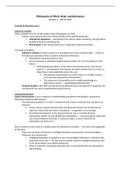Philosophy of Mind, Brain and Behaviour
Lecture 1 – 06/04/2021
Concept of the mind, part 1
Substance dualism
Mind; umbrella term for all the mental states that people can have.
- Mental; most mental states have either of both of two specific properties.
1. Intentional; aboutness -> everything in the mind is about something, thought refers
outside of itself to something else.
2. Phenomenal; most mental states have a subjective experimental state.
Two kinds of dualism;
- Substance dualism; humans consist of an immaterial soul and a material body. -> mind is a
non-physical substances that is causally connected to the body.
Mind doesn’t need the brain to exist.
Lot of responses to substance dualism because there are a lot of problems in this
theory.
1. Methodological problems; if the mind is an immaterial soul, how do you
study it? -> introspection, but nobody can check whether this is correct, no
objectivity or intersubjectivity about the soul.
Unconscious mental states can not be topic of scientific research ->
can’t even be measured by introspection.
The response to this problem was to define psychology as a
behavioural science. -> psychological behaviourism
- Property dualism; the mind is produced by the physical brain, but some of its properties are
non-physical (can not be explained by physical terms).
Logical behaviourism
Logical behaviourism is not a response to methodological problems with dualism; response to
theoretical problems with dualism.
- The interaction problem; if a mind is immaterial and a body is material, how can they ever
interact?
Theory doesn’t explain how the body and the brain interact, but he did have an
argument about why the mind is immaterial. -> magnetism as an example
Everything that happens in the physical domain, has a complete physical
explanation; ideally, we can identify that explanation. -> the pineal gland, where the
soul should influence the body, is a physical organ, so there should be an
explanation but there isn’t.
Direct response to the mind as a hidden cause for behaviour in dualism. -> the soul is the puppeteer
of the body.
- There are two kinds of behaviour; intelligent behaviour (purposeful) and non-intelligent
behaviour (non-purposeful).
Intelligent behaviour is caused by a soul, non-intelligent behaviour is whatever the
body does on its own. -> so, the mind is another word for intelligent behaviour and
is not some hidden cause behind behaviour.
Want to make the conceptual distinction into a causal distinction, but that doesn’t
add anything.
, Psychological and logical behaviourism are different.
- They both focus on behaviour, but psychological behaviour does not even talk about the
mind in favour of behaviour. Logical behaviourist doesn’t ignore the mind, it tries to define
the mind in terms of behaviour.
Problems with behaviourism
- Not dealing with the fact that our concept of the mind is also something subjective and the
inner experience of the mind isn’t captured by behaviourists.
- You can’t make a one on one connection between a specific disposition and a specific
behaviour, everybody has different reasons to perform a specific behaviour (mental holism).
Concept of the Mind
If you actually look at the way people use words of the mind, they don’t refer to a locus of control:
they stick to behaviour that is already discerned as intelligent.
- Category mistake; mind is not a thing
- Mental states are behavioural dispositions -> tendency to act in a certain way under certain
circumstances, if-then situations.
- Mind is a huge collection of behaviour dispositions of people, so it is not a thing; the mind is
not a soul. -> category mistake
- Mind = atmosphere comparison
Identity theory
Ullin Place; beliefs, hopes etc. are behavioural dispositions, but consciousness is also a brain process.
- The mind is identical with the brain
The mind is as manipulable as the brain; not a knock-down argument, but a
discovery.
- Mentalistic language; by the words people use to describe consciousness, people don’t
directly describe their mind.
- If dualism would have been true, this would probably have been proven, but it isn’t.
Everything that happens to the brain, happens to the mind, which makes it highly
likely that the mind is the brain according to identity theory.
- Two problems with the identity theory
Explanatory gap; stating that mental states are brain states doesn’t explain
anything. -> how can intentionality and phenomenality be physical?
Multiple realization; according to the identity theory, organisms with different
brains can not have the same types of mental state, because mental states are
identical to the brain. Different brains can’t have identical mental states/brain
states.
But it isn’t true; lots of organisms who don’t have the same brain functions as
humans do exhibit the same behaviour, which makes it very likely that they have the
same subjective experience as well; so the same brain/mental state can be realized
by different brains.




